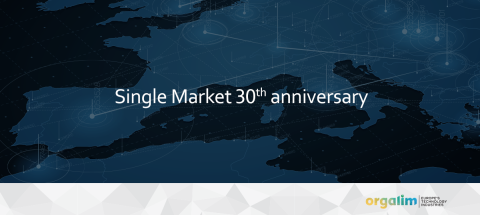Securing Europe’s industrial competitiveness – An agenda to recommit to the Single Market
15 February 2023

As Europe marks the 30th anniversary of the Single Market this year, Orgalim joins the celebrations and contributes an agenda for strengthening it over the next 30 years. Alongside this agenda, we share the views of leading European industrialists at the forefront of the net zero industry transformation on the internal market problems they encounter and what can be done to fix them.
"The Single Market is the EU’s crowning achievement. It is also our greatest asset in the race to secure Europe’s long-term industrial competitiveness and net zero transformation," said Malte Lohan, Orgalim’s Director General. "With this agenda, and the accompanying insights from industry, we identify policy priorities for addressing the fragmentation and barriers that are currently preventing it from realising its full potential."
The Single Market is the EU’s crowning achievement. It is also our greatest asset in the race to secure Europe’s long-term industrial competitiveness and net zero transformation.
Orgalim was one of the earliest voices advocating for the Single Market and has supported it since its inception, contributing its industrial expertise throughout the years to help make the policy framework fit for purpose. The agenda published today emerges from the work of Orgalim’s Internal Market Working Group, composed of experts from across its membership and industry sectors.
"The Internal Market Working Group exists since the foundation of Orgalim and can count on industry experts from across the EU, who know the Single Market inside-out and are best placed to support legislators in strengthening it," said Roxana Turcanu, Internal Market Working Group Chair. "The 30th anniversary is an occasion to celebrate the Single Market's success, but also to highlight concerns on current issues. The group works actively so those issues won’t become threats."
As we engage actively on the reflections about the future of the Single Market, we will also be sharing insights from technology industry leaders across Europe into the barriers and the benefits they experience doing business in the internal market today.
We encourage you to share and join in this campaign, using the hashtag #SingleMarket30. If you are interested in finding out more, please contact communications@orgalim.eu.
More information about the European Commission’s Single Market 30th anniversary celebrations can be found on their dedicated website.

Read hereafter the views of leading European industrialists from across the Orgalim network on the current state of the internal market and the issues they experience:
"European Standardisation in the past has been a strong pillar of the EU’s Internal Market and helped to enhance the EU’s competitiveness and contributed to setting standards globally. In recent years, there has been an increasing number of problems with the delayed listing of harmonised standards giving presumption of conformity under EU legislation. These delays cause increased costs for our business, they prolong compliance procedures and time-to-market."
– Dr Gunther Kegel
CEO, Pepperl+Fuchs SE and ZVEI-President
Orgalim representative on the High-Level Forum on European Standardisation
***
“I am concerned by an increased wave of EU legislation. No political will can manage industrial supply chains and Covid actually proved they worked. Rather what we need is a stable framework for the industrial revolution to continue and innovation to happen. In my career, it is the first time politics and business are on the same page, where European businesses welcome better platforms for dialogue on how to embrace tackling climate change that will strengthen the competitiveness of the Internal Market.”
– Tom Erixon
CEO, Alfa Laval
***
“The needs and context that founded the European Single Market have changed and are changing rapidly. It is more important than ever to make the superior value of the community a strength, to face international challenges by mitigating local threats.”
– Fabio Fogliani
Managing Director, Beijer Ref Italy
***
“The harmonisation of the Single Market reduces significantly the administrative paperwork that would otherwise be needed to sell the same product across 27 countries. With the UK's exit from the EU, we've been painfully reminded of what it's like to not have this level of harmonisation.”
– Christophe Lautray
Executive Vice-President Sales & Service, KION Industrial Trucks & Services EMEA
***
“To develop products and services meeting customers and EU standards requirements is challenging, but it is an important advantage also looking at other markets. The safety linked to CE marking is globally recognised, having become a passport for interesting markets all over the world. The EU should continue to invest in the harmonised standardisation process, not only to maintain a robust internal market but also to support the exports of our companies and the growth of our economy.”
– Ernesto Domínguez
CEO, Toyota Material Handling Europe
***
“Remembering that rules must help the direction and not block companies with a burden of bureaucracy is a must: we would like European support for an Industry 5.0 - sustainable and Intelligent.”
– Marco Nocivelli
Chairman and CEO, Epta
***
“After 30 years, there are still many virtual barriers within Europe. From the technical standpoint, it is important to unify specifications for product type approval and ensure that an approval in Italy is accepted in any other country. Looking further ahead, the structure of labour contracts and costs, taxes, and other costs such as energy, should be comparable in all European countries. To become a world player in the political arena, Europe needs to speak with one voice.”
– Sandro Bonomi
President, Bonomi Industries
***
“Up to now, the single market has greatly contributed to the simplification of our product lines across the EU market, and to cohesive technical regulations. It has also made it easier to work with retailers and improved efficiencies across the supply chain and in internal business processes. However, recent legislative developments are putting these benefits at risk. We are facing a proliferation of country specific requirements, which increases complexity in the distribution of products.”
– Rudolf Harrer
Head of Sales Power Products, Honda Motor Europe Ltd
***
“Fortunately, in our business, the EU market is one that generates many annual orders for our company. However, we experience excessive bureaucracy to import and export products even inside what should be a community.”
– Renzo Comacchio
President, Comacchio SpA
***
"Export is a challenge for all companies. The Internal Market makes it easier. It has helped us to develop foreign partnership faster. Intensifying partnership with close countries and reinforcing our European domestic market is crucial in a changing world where long distance exportation is getting uncertain, and sometimes inconsistent with our sustainable vision.”
– Julien Jean
Commercial Director, Cristel

LATEST NEWS
How can we create a dynamic, competitive European high-tech manufacturing base?
Orgalim's key recommendations offer policymake...
